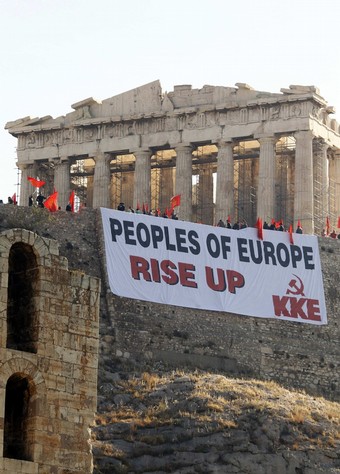Democrat May-June 2011 (Number 123)
The euro crisis -
Plans to grab Greece's
national assets

An old adage says: ‘if you owe the bank £5,000 you are in trouble, but, if you owe the bank £1 million then the bank is in trouble”.
This is part of the problem surrounding the so-called sovereign debt of Greece where a further loan is being cobbled together. It is obvious no matter how much privatisation and austerity cuts the Greek Government try and foist on the people it will not solve the problem. The problem was not made by the people.
Following the theft of the Elgin Marbles two centuries ago, plans are being hatched to take over other national and ancient assets of Greece. The story is that the cash would help pay off the debt owned by banks largely in the Netherlands, France and Germany.
Juxtoposition of the Acropolis which EU politicians want the Greek Government to sell to finance capital and the banner displayed during a recent general strike against cuts and privatisation
The Financial Times (25.5.11) reports that “(EU) leaders are pushing to impose measures that would ensure the Greek government lives up to its promise to deliver €50bn (£44bn) in privatisation proceeds, amid scepticism that Athens can carry out the sell-offs.
“Officials involved in the discussions believe far more than €50bn could be raised in sales of state-owned assets, with estimates ranging from €250bn to €300bn – or almost all of Greece’s outstanding debt.”
Advocates for this plan include banks in EU Member States. They took the speculative risk to lend and now shout “give us our money”. It is the banks which are in trouble and should just go bust or write-off the debt.
Iceland declined to pay out a large amount to banks. The decision was backed by the people of Iceland. There have been no reported catastrophes. The same goes for Ireland and Portugal with Spain expected to follow.
Arranging for outside vested interests to buy national assets is a direct contravention of the right of nation-states to self determination.
The Greek people are more and more opposed to their wages and conditions being cut and further pressed down. This is most likely why Jean-Claude Junker, Luxembourg Prime Minister is calling for a “soft re-scheduling” of debt repayments as he and others are fearful of the Greek people, especially the young, taking matters into their own hands.